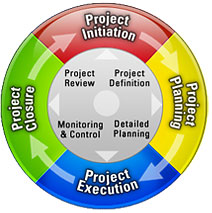Does KM have to be a project? We argue that it does.
 |
| Image from wikimedia commons |
To the extent that the implementation phase of Knowledge Management
- needs a strategy and a plan
- needs a team and budget
- has a start and an end, and
- has objectives and deliverables
then it needs to be managed as a project.
Implementing KM is a special type of project - a change management project, planning to develop and implement a new management framework - but its still a project. The Head of KM, or the CKO, or the Knowledge Manager for the organisation acts as the project leader, in order to
- Develop, together with the leadership of the organization, the vision, objectives, metrics and deliverables of the knowledge management implementation project. The delvierables should include a definition of the end state - for example an embedded KM framework with rolesm, processes, technology and governance all in place and applied.
- Deliver these objectives; accountable for delivery, for the budget, for managing the members of the knowledge management implementation team, for managing progress and activity; all of the standard accountabilities of a project manager.
- Define and test the knowledge management framework through the testing and piloting phase, and ensure that the KM framework operates effectively and efficiently.
- Ensure that the KM framework delivers business value.
- Embed the KM framework within the structures, habits and rhythms of the organisation.
- Hand KM over to an operational KM team, to manage, maintain and continuously improve it.
Whatever process you use internally for managing projects; apply it to your KM implementation.
Stage gates, project plans, steering committees, Prince 2 - whatever your internal project management processes is; apply it, so that KM implementation is seen as, and treated with the same rigour as, a "proper project".
Whatever tools you use for project management, apply them to your KM project.
Whatever tools you use for project management, apply them to your KM project.
SMART objectives, work breakdown, risk mapping, knowledge gap mapping, gantt and pert charts, and project KM tools such as After Action Review and Retrospect.
Once the implementation is over, KM stops being a project, and starts being an operational management discipline, just like safety management, financial management, risk management or talent management. KM still needs to be a main focus of attention, and there needs to be an oversight and support team in place with a clear role to play, as well as KM roles throughout the business.
Contact Knoco for help with your Knowledge Management Project
Once the implementation is over, KM stops being a project, and starts being an operational management discipline, just like safety management, financial management, risk management or talent management. KM still needs to be a main focus of attention, and there needs to be an oversight and support team in place with a clear role to play, as well as KM roles throughout the business.
Until then, though, its a project.
Contact Knoco for help with your Knowledge Management Project




No comments:
Post a Comment